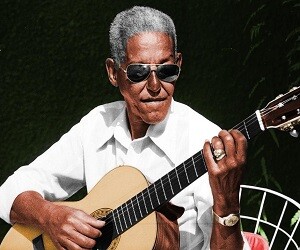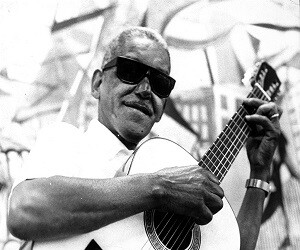

Last Updated: 10 Apr, 2024 | Views: 920
Age: 72
Profession: Singer
Other Profession(s): Composer, Poet, Song writer
Famous For: His Sambas
About (Profile/Biography):
Angenor de Oliveira, or Cartola, was born on 11th October 1908 and died on 30th November 1980. As a singer, composer, and poet, he greatly influenced the development of samba music. More than 500 songs have been composed by Cartola, alone or with partners.
Cartola Career:
• Cartola worked in Macaé (RJ) - at the Bertioga Farm of the aristocratic D. He was recruited by D. Anita Peçanha, cousin of D. Julia and wife of the future President of Brazil, Nilo Peçanha. The grandfather of Cartola served Peçanha at the Catete Palace in Rio de Janeiro.
• As a teenager, he abandoned his studies (only 4th grade) to work; at the same time, he leaned toward the bohemian lifestyle. Initially, he was an apprentice printer but became a bricklayer soon after.
• Cartola became popular in the 1930s and recorded dozens of sambas, but he was not rewarded financially. He was a bricklayer, fishmonger, cheese seller, and occasionally a cook to support his growing family.
• Cartola released his first record in 1974 at age 66; despite financial difficulties, he composed and sang until he died at 72. Cartola's life story is portrayed in Music For The Eyes, directed by Laria Ferreira and Hilton Lacerda.
• Divino Cartola - Uma Vida em Verde e Rosa, a biography by Denilson Monteiro, was published in January 2013. Cartola and Zica appear briefly in the 1959 film Black Orpheus as a couple during the main characters' marriage registration.
Cartola Popular Works:
• Cartola wrote melodies, harmonies, and lyrics. The use of Portuguese in his lyrics is exceptional, especially since he has not received a formal education.
• Cartola binds emotion and elegance effectively, while keeping the level of complexity low, making his work accessible to a greater audience.
Cartola Personal life:
• Cartola stopped playing and composing; he moved to the slum of Manilha in Nilópolis, where he worked as a handyman. Dona Zica, with whom he was in love for the remainder of his life, persuaded him to return to music in 1952.
Wait!
Here're some popular profiles for you.


